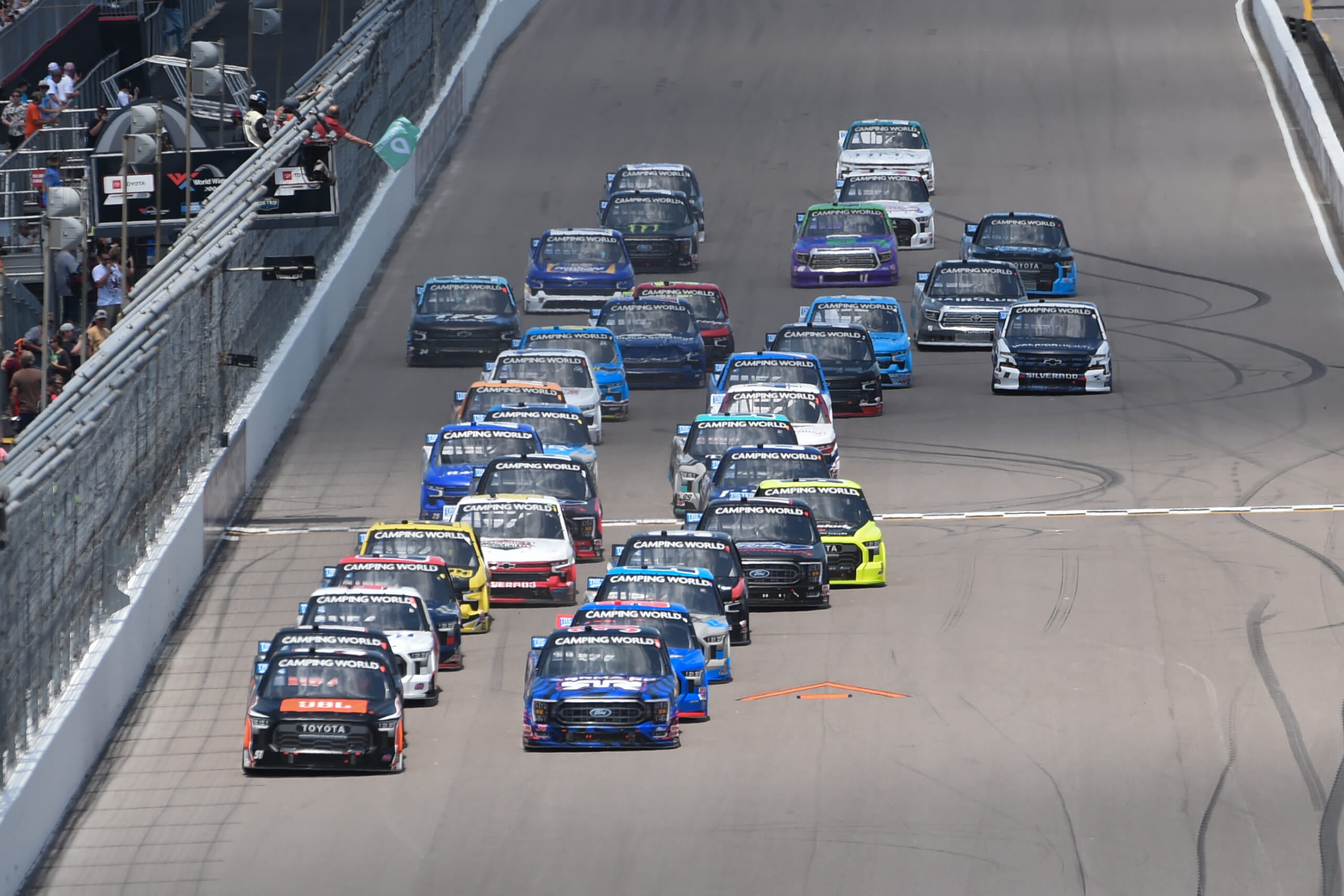The news that highly coveted Toyota prospect Sammy Smith is making select NASCAR Xfinity Series starts for Joe Gibbs Racing in 2022 brings us to the question of the Truck Series and its development.
What is the status of NASCAR’s third-highest level?
NASCAR Truck Series in the development ladder
Many drivers have made a name for themselves in the Truck Series, but others have also seen their development stall or even fall behind due to the chaos.
Zane Smith is one example of how the Truck Series can change careers in a positive manner. Smith jumped to the Xfinity Series with JR Motorsports and ran decent but not fantastic.
Related: NASCAR TV ratings
Smith moved back to the Truck Series and after two years at GMS Racing, the young driver is in the midst of a breakout season with Front Row Motorsports.
However, some drivers have skipped the Truck Series altogether and found success. Ty Gibbs, the driver of the No. 54 car for Joe Gibbs Racing, jumped straight to the Xfinity Series in 2021 and won three times.
Gibbs is one of the top prospects in NASCAR and didn’t need the Truck Series. It can depend on the circumstances surrounding them, but there have been many examples lately.
Noah Gragson and Harrison Burton were both average in the Truck Series but saw a career jump when they joined the Xfinity Series. On the contrary, Sheldon Creed is struggling in the Xfinity Series.
Hailie Deegan called out the Truck Series to develop “more discipline and structure” as the series can turn into chaotic events that can lack respectful and clean driving.
This can create even more questions about the future of the Truck Series and what it could turn into if changes are not made.
The future of the NASCAR Truck Series
It has been a trend dating back to the 2021 NASCAR Truck Series season. The events run in the Truck Series have turned into borderline demolition derbies with the number of wrecked vehicles.
There has not been a lack of drama but it can also hurt the development of the drivers. Specifically, the drivers in the mid-pack vehicles see significant trouble due to accidents or mistakes.
Motorsports 5: NASCAR at Gateway, Portland mayhem
Another issue that is brought up involves how much different the trucks feel compared to the Xfinity and Cup cars. They aren’t really close to the same and full-throttle racing shows up more often.
The benefits might outweigh the negatives on some occasions, but it truly creates a question on whether more organizations and future NASCAR stars consider the idea of skipping the Truck Series.
Ty Gibbs and Riley Herbst are two Toyota drivers that were full-time in the Xfinity Series before the Truck Series. Sammy Smith might be following that same path with his debut at Road America.
Rajah Caruth and Nick Sanchez, ARCA drivers for Rev Racing, also went straight for Xfinity Series starts instead of the Truck Series right away.
Are these just coincidences or is the Truck Series becoming irrelevant to some drivers during their development? It’s a good question and looking at the statistics makes it interesting.
It’s even a situation that has gone back to the 1990s. Jimmie Johnson, seven-time NASCAR Cup Series champion, completely skipped the Truck Series and went to the Xfinity Series.
Tony Stewart, three-time Cup Series champion, went to the Xfinity Series for more races. However, Kevin Harvick and Greg Biffle ran the Truck Series in the late 1990s and developed amazing careers.
Matt Kenseth, one-time Cup Series champion, went to the Truck Series instead. The list goes on and on for however long you look at the statistics.
While those were different times in the 1990s, it’s interesting to look at how the Xfinity Series has been the most dominant lower series.
There has not been a single Truck Series champion that went on to win the Cup Series championship. However, there have been five-plus Xfinity Series champions that turned into Cup Series champions.
As more drivers move straight to the Xfinity Series, could the future of the Truck Series be a little murky if the current trend of wrecked vehicles and messy racing continues?
It’s certainly a situation to watch and if more young drivers, like Gibbs and Smith, make the move, it could put the Truck Series in a questionable position on the development ladder.

